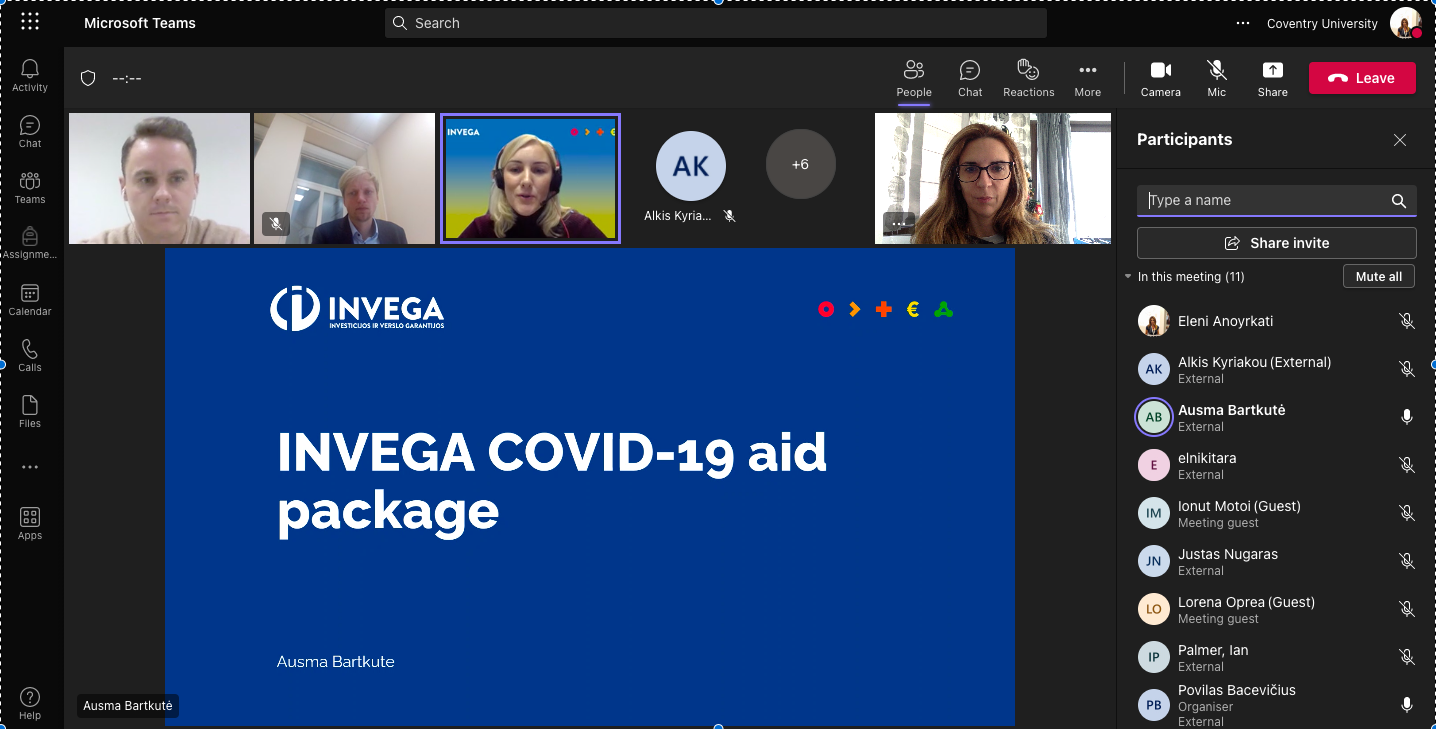
Virtual Study Visit in Lithuania
The final virtual study visit was hosted by LIC, Lithuania
RECREATE will improve the capacity and capability of regional transport SMEs to further develop and grow, this includes support for :
1. Research and Development
2. rapid development and implementation of products and services
3. Access to finance schemes.
4. Internationalisation opportunities.
RECREATE adopts a holistic approach to SME support by by improving all the relevant schemes that could potentially deliver growth to the regional transport SMEs. Recognising the importance and the potential of the transport SMEs in the economies of the regions involved, RECREATE will map transport SME support measures and assess their effectiveness. The integrated approach adopted by the RECREATE project will drive the identification and development of support mechanisms in the transport SME sector and it will ultimately deliver Action Plans and policy recommendations for evidence -based policy improvement.
€828,032.00
SME competitiveness
RECREATE will adopt an overarching approach to support all types of transport SMEs:
Strategic Innovators
High technology research intensive seeking to develop technology.
Exploitation Seekers
Seeking to exploit research results.
Technology Translators
Translate between technologies and the market.
Technology Networkers
Seek for a better understanding of technology developments relevant to their business and to develop commercially useful relationships.
For the 2014 to 2020 programming period the ultimate goal of the OP is to improve the economic competitiveness of the Coventry and Warwickshire economy, as this remains the benchmark against which developed economies continue to be measured.
Under Priority 3 (Enhancing the competitiveness of SMEs), the programme aims to support SMEs to be able to compete in at both national and international markets. Evidence from the economic review of the Coventry and Warwickshire LEP area shows the continuing importance of manufacturing to the local economy, and highlights the existing strengths in this sector, particularly with regards to vehicle engineering. The main actions of the programme will be targeting the following main market failures faced by the regional SMEs: 1. Limited access to external information, advice and expertise; 2. Imperfect market knowledge; 3.Limited access to finance. Under the priority 2 of priority axis 3 the ROP is expected to support the capacity of small and medium sized enterprises to grow in regional, national and international markets and to engage in innovation processes especially in one of the high growth sectors such as vehicle engineering and transport manufacturing.
The OP needs to be improved in terms of incorprorating new actions that would have a specific focus on transport SME support as the sector is already recognised as of high potential for the region.
Campania Region ROP constitutes the reference frame in relation to the use of EU funds. The aim of the programme is to ensure that regional instruments are coherent and consistent with the EU development policies. The Program is divided into 11 priority intervention axes and thematic objectives. Particularly the Axis 3 “Competitiveness of production and manufacturing system” aims at enhancing growth and development of SME as well as their competitiveness through the development of innovative business ideas and the uptake of new technologies. Among investment priorities we also find enhancing entrepreneurship mind-set, internationalisation dynamics support, diversification of products and services.
Particular attention has been put on mobility systems and new means, in order to boost towards the efficiency of resources and green economy. In particular, the objectives to be achieved are: ensure the accessibility of people and goods to the entire regional territory; Improve the interconnection of Local Territorial Systems with national, interregional and interrelated networks; Improve the harbor and internal connections of harbor system; Realize alternative transport systems for sensitive areas. Thus SMEs operating in the transport sector ( especially the 'green transportation') are the top priority of Axis 3.
The Programme aims to boost economic development and create job opportunities in the islands of South Aegean. It contributes to achieving the Europe 2020 targets for smart, sustainable and inclusive growth, also in line with the smart specialization strategy. It will create jobs and help SMEs to become more competitive and innovation-driven. Specifically, under TO3 the focus is to increase the competitiveness, size and potential of the SME market. The uptake of collaborative models for SMEs across the value chain will be given priority especially to SMEs that are connected with the areas of Smart Specialisation. Advisory services to support SMEs are also provided through the ROP for the following activities:
- develop new products and processes;
- technical assistance in solving technological problems;
-design of new products, organisational innovations, process innovations;
-identification of new markets and development of penetration strategies; and
-clusters and collaborative networks.
Transport services and products are given attention in the ROP because the region relies heavily on tourism, therefore, the move of products and people are of imperative importance. Under TO7, there is a substantial amount of funding to be directed to the companies & SMEs who are active in the sustainable mobility sector too. One more area of focus both on TO3 of the ROP but also in the smart specialisation strategy is the further development of ICT in transportation.
INVESTMENT PRIORITY 3.3 – “Supporting the capacity of SMEs to grow in regional, national and international markets, and to engage in innovation processes”
Within this priority Lithuania will seek to increase productivity and allow enterprises to use time and financial savings for the development or improvement of high value-added goods and services.
To achieve traditional transformation of the industry support will be provided for the deployment of technologies (KETs) important for the innovation of the industry and the economic growth in SME production processes. KETs have a multiple effect on many industrial value chains and sectors. They help create value in the entire chain: from materials, equipment and machinery to goods and services. SMEs will be promoted to use research results and develop mass industrial production and supply of NGA-based goods. It is expected that implementation of this objective is expected to boost the productivity of Lithuanian SMEs.
With regards to transport, SMEs are encouraged to develop resource-efficient technologies more often. Lithuania’s international competitiveness in the
transport and logistics sector is to a large extent determined by its geographical position, as east- and west-bound freight flows cross the country connecting the Baltic Sea region, the CIS and Western Europe. This makes the transport sector the largest contributor to the Lithuanian economy (around 13 % of GDP) thus supporting transport SMEs is a key focus of the OP
Priority Axis 2 - Improving the competitiveness of small and medium-sized enterprises; Investment Priority 2.2 - Support the creation and expansion of advanced production capacities and service development; Specific Objective - to improve economic competitiveness by increasing labour productivity in SMEs in competitive sectors identified in the National Competitiveness Strategy.
Through this investment priority, specific activities will be supported:
- Construction / upgrading and extension of the SME production / services area
- Activities required to run and implement the certification process
- Promotion of products and services
- Activities specific to the internationalization process
While the policy instrument recognises the importance of supporting the competitiveness of SMEs in the region, the flow of information and cooperation between these SMEs remains suboptimal.
To improve the transport-related SMEs competitiveness, the OP supports the creation and expansion of advanced production capacities and service development in these SMEs, which need to be more innovative in new product development, financing, logistics, within the transport-related technology circuit. Based on the above considerations, the policy instrument should be improved.

The final virtual study visit was hosted by LIC, Lithuania
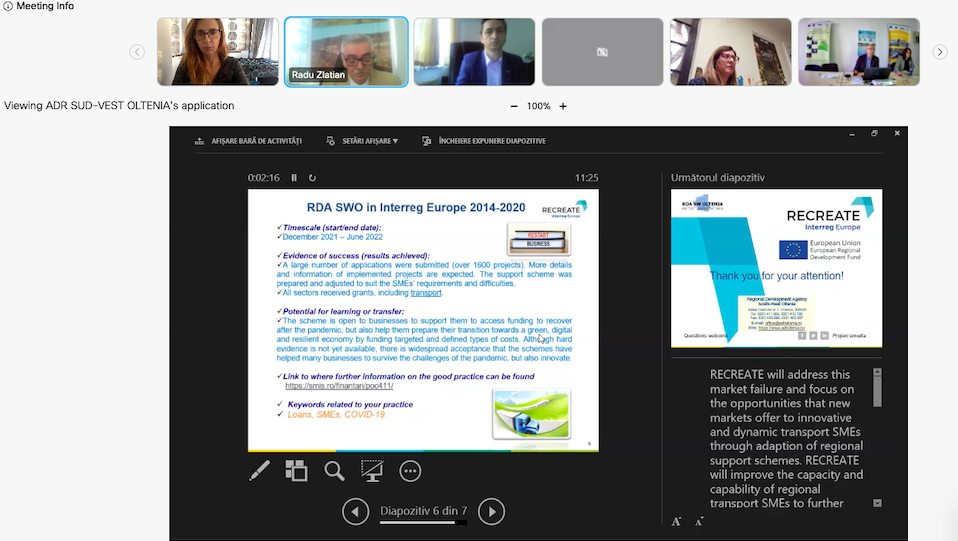
A very interesting virtual study visit hosted by the Regional Development Agency South-West Oltenia
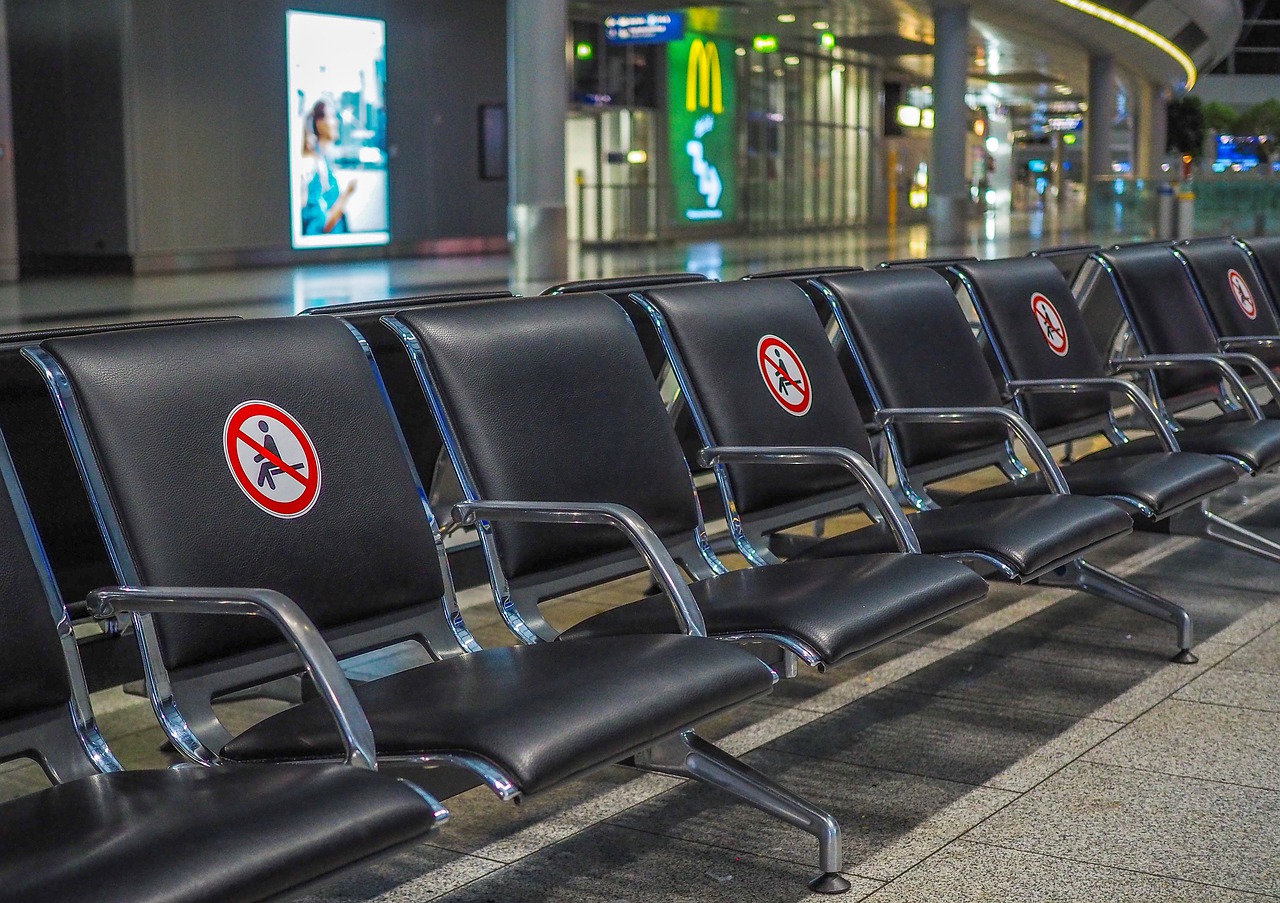
The third Virtual Study Visit will take place on 18th October 2022.
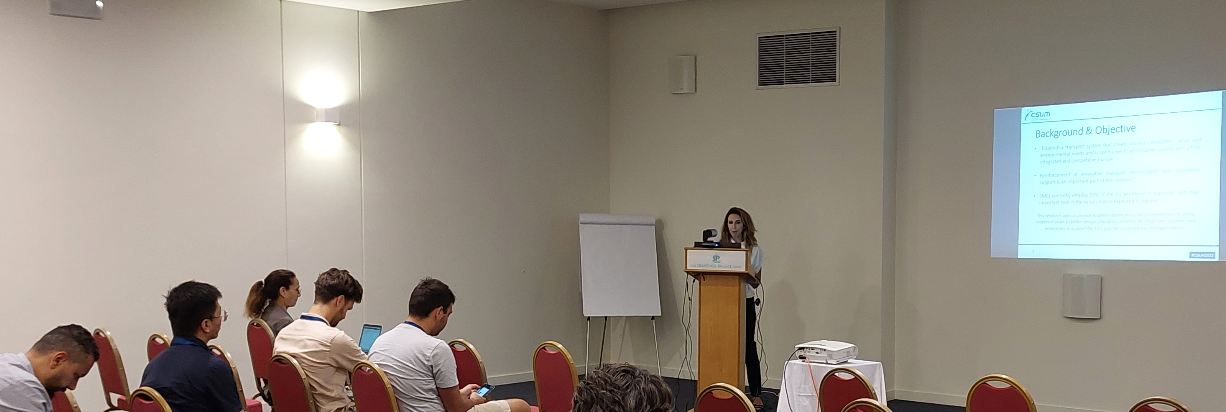
A paper based on some of the RECREATE results and findings was presented at the 6th Conference on Sustainable Urban Mobility – CSUM 2022.

The agenda of the RECREATE final dissemination event, part of the 6th Conference on Sustainable Urban Mobility – CSUM 2022, has been published.

The Interregional Joint Stakeholder Workshop will take place in Greece on 1st September 2022.

On Friday 17th June 2022 the RECREATE project partners participated to the Policy Learning Platform online discussion about Resilience of the regional economy.
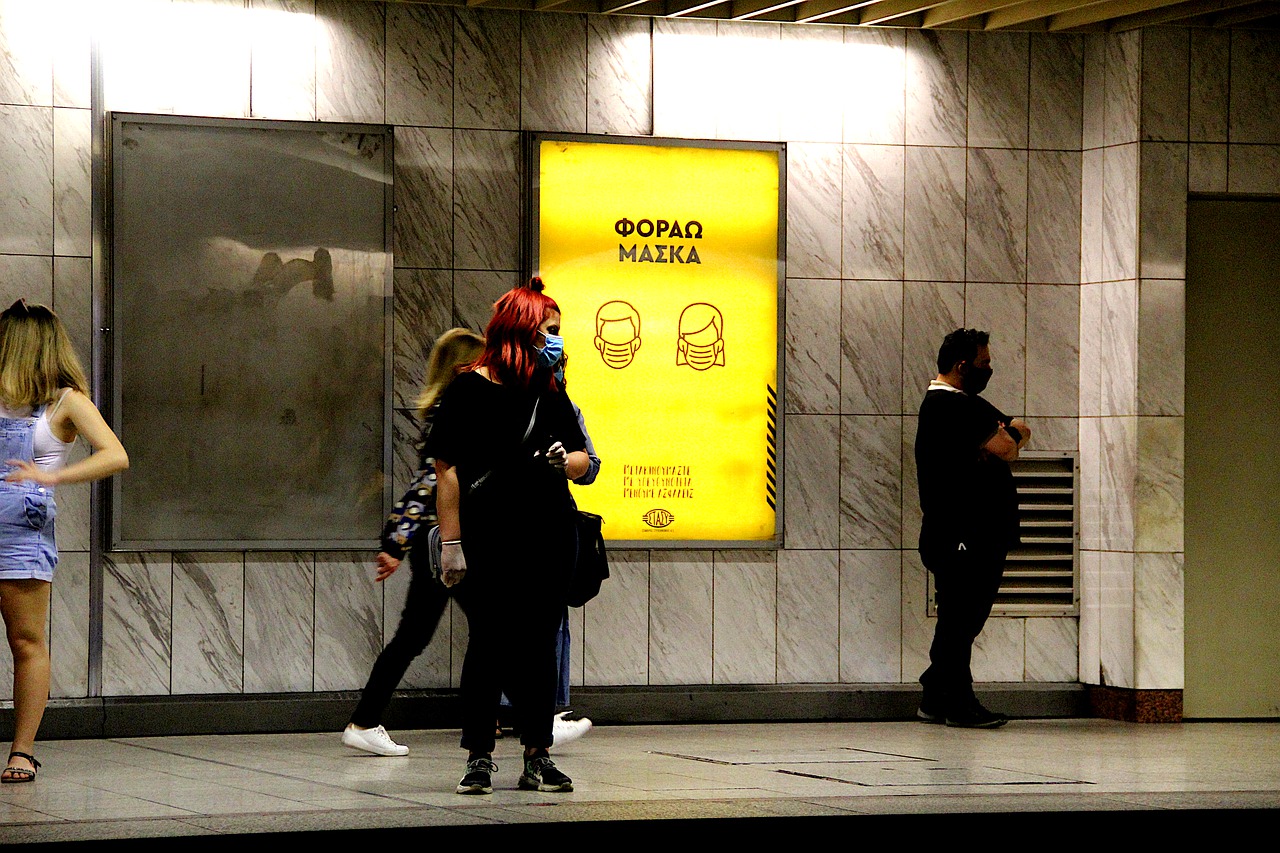
The second Virtual Study Visit will take place on 18th May 2022.
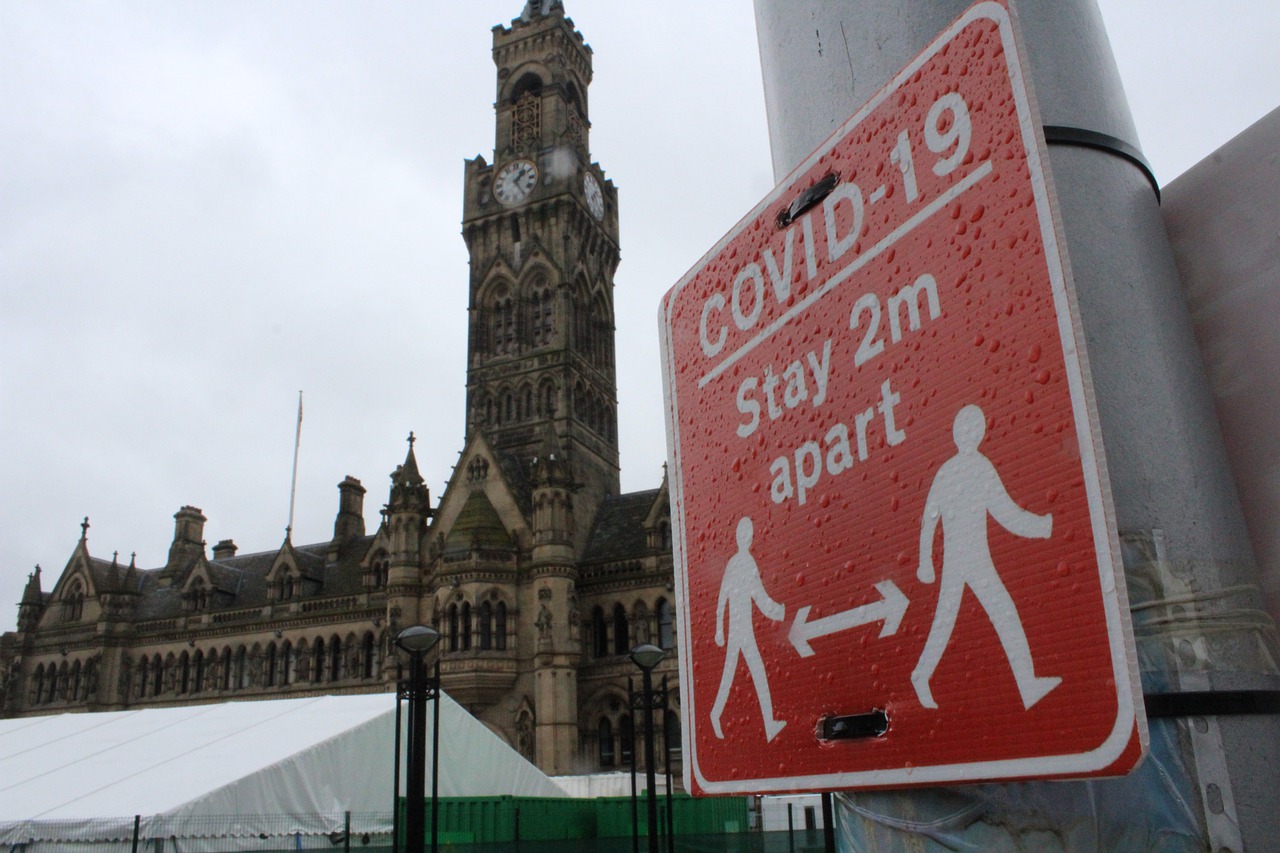
The first Virtual Study Visit will be organised by the Lead Partner Coventry University Enterprises Ltd and will take place on 10th May 2022.
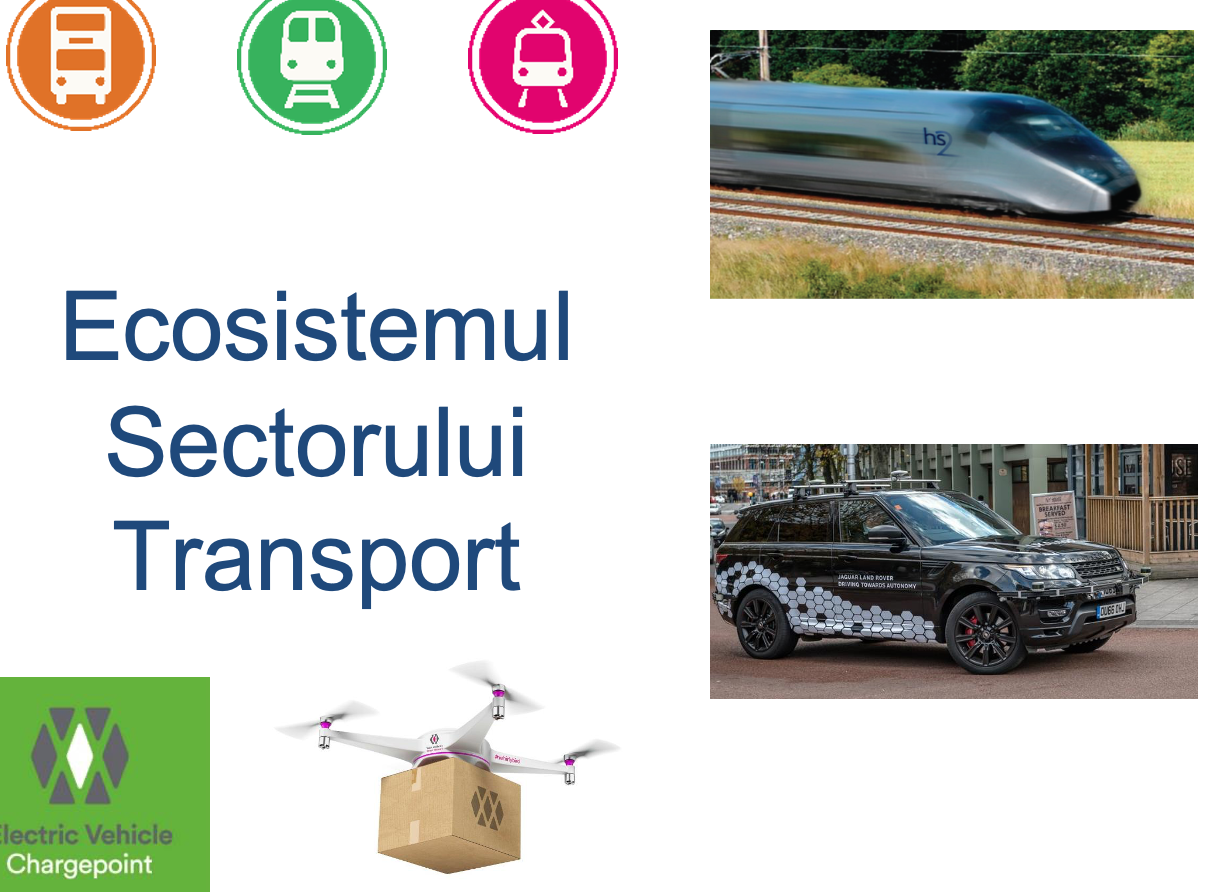
On 30th March 2022, the RECREATE Project was presented at a Stakeholder Meeting organised within the UpGrade SME Project.